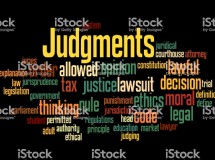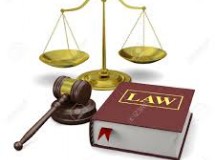A person's criminal record and arrest history is broken down into several categories. Thanks to reality television and motion picture magic, most of us are familiar with terms like felony, misdemeanor, and conviction record. But do you really know what they mean? Here's a breakdown of the different types of criminal offenses:
Felony
In the United States, serious criminal offenses (those that include a potential punishment of two and a half years or longer in prison) are referred to as felonies. Murder, rape, kidnapping, aggravated assault/battery, arson, burglary and grand theft are all considered felony crimes; as are embezzlement, tax evasion, racketeering, treason and espionage. Certain offenses may also straddle the line- being considered either a felony or a misdemeanor, depending on the circumstance. For example, Manufacturing, distributing, or possessing a controlled substance is often considered a felony, but possession of a very small amount can be considered a misdemeanor.
Misdemeanor
Misdemeanors are less severe criminal acts. Technically, a misdemeanor is defined as a crime that is punishable by less than two and a half years of jail time. However, the vast majority of majority of them are punished with monetary fines. (Although repeat misdemeanor offenders are much more likely to serve jail time) Misdemeanors are the most likely type of offense to be expunged off of a person's criminal record.
Parole Violations
People who are serving a jail sentence for a felony conviction may be eligible, after a certain period of time for parole. In essence, parole is a conditional release from prison. When you seriously violate those conditions for your release, you have committed a parole violation, and could potentially go back to jail. Some of the most common parole violations include not checking in with your parole officer (PO), possessing drugs, alcohol or weapons, failing a drug test, not wearing your GPS monitor, or (in cases of sex offenders) being near a school zone or playground).
Probation Violations
Unlike parole, which comes after you have served prison time, probation is assigned as an alternative to a jail term. Violating the terms of probation can result in several consequences, including a revocation of probation (in which case a prison sentence would be imposed), en extension on the length or severity of the probation, community service, or mandatory substance abuse treatment.
Sex Offender Status
Enacted in 1996 after the kidnap, rape and murder of a seven year old girl, Megan's law made the information found on the FBI's national sex offender registry available to the public. This means that people who have been convicted of certain sexual crimes (including rape, sexual assault, and child molestation) must register for life as a sex offender. Depending on what the court decides is the likelihood of a person to commit another sexually based offense, each registered sex offender is categorized as a level 1, 2, or 3.
Traffic Violations
While most driving violations do not go on your criminal record, certain serious traffic offenses will. These will then also be listed on the National Driver Registry (which is maintained by the US Department of Transportation) and can be accessed by an employer if that person seeks a job that involves driving or working with motor vehicles. These serious violations include accidents that resulted in fatalities and DUI arrests.
Aside from the different types of violations, there are also several forms of criminal history records, including:
Arrest Records
Every time someone is arrested, a detailed description of the arrest, including pictures, dates, convictions, and sentencing information is added to their arrest record.
Conviction Records
In addition to listing all of the crimes that a person has been convicted of, a conviction record includes any dishonorable military discharges, as well as a history of any time spent in jail, on probation or on parole.
Inmate Records
Whenever someone serves prison time, they also have what is known as an inmate record. This stays within the prison system, and describes not only the reason why a person was imprisoned, but also records their behavior and additional offenses while behind bars.
This records and arrest history system is set up to aid law enforcement agencies- and to keep the otherwise chaotic world of criminal justice and background investigations as organized as possible.
For further information about criminal records visit: http://www.criminalpages.com
Felony
In the United States, serious criminal offenses (those that include a potential punishment of two and a half years or longer in prison) are referred to as felonies. Murder, rape, kidnapping, aggravated assault/battery, arson, burglary and grand theft are all considered felony crimes; as are embezzlement, tax evasion, racketeering, treason and espionage. Certain offenses may also straddle the line- being considered either a felony or a misdemeanor, depending on the circumstance. For example, Manufacturing, distributing, or possessing a controlled substance is often considered a felony, but possession of a very small amount can be considered a misdemeanor.
Misdemeanor
Misdemeanors are less severe criminal acts. Technically, a misdemeanor is defined as a crime that is punishable by less than two and a half years of jail time. However, the vast majority of majority of them are punished with monetary fines. (Although repeat misdemeanor offenders are much more likely to serve jail time) Misdemeanors are the most likely type of offense to be expunged off of a person's criminal record.
Parole Violations
People who are serving a jail sentence for a felony conviction may be eligible, after a certain period of time for parole. In essence, parole is a conditional release from prison. When you seriously violate those conditions for your release, you have committed a parole violation, and could potentially go back to jail. Some of the most common parole violations include not checking in with your parole officer (PO), possessing drugs, alcohol or weapons, failing a drug test, not wearing your GPS monitor, or (in cases of sex offenders) being near a school zone or playground).
Probation Violations
Unlike parole, which comes after you have served prison time, probation is assigned as an alternative to a jail term. Violating the terms of probation can result in several consequences, including a revocation of probation (in which case a prison sentence would be imposed), en extension on the length or severity of the probation, community service, or mandatory substance abuse treatment.
Sex Offender Status
Enacted in 1996 after the kidnap, rape and murder of a seven year old girl, Megan's law made the information found on the FBI's national sex offender registry available to the public. This means that people who have been convicted of certain sexual crimes (including rape, sexual assault, and child molestation) must register for life as a sex offender. Depending on what the court decides is the likelihood of a person to commit another sexually based offense, each registered sex offender is categorized as a level 1, 2, or 3.
Traffic Violations
While most driving violations do not go on your criminal record, certain serious traffic offenses will. These will then also be listed on the National Driver Registry (which is maintained by the US Department of Transportation) and can be accessed by an employer if that person seeks a job that involves driving or working with motor vehicles. These serious violations include accidents that resulted in fatalities and DUI arrests.
Aside from the different types of violations, there are also several forms of criminal history records, including:
Arrest Records
Every time someone is arrested, a detailed description of the arrest, including pictures, dates, convictions, and sentencing information is added to their arrest record.
Conviction Records
In addition to listing all of the crimes that a person has been convicted of, a conviction record includes any dishonorable military discharges, as well as a history of any time spent in jail, on probation or on parole.
Inmate Records
Whenever someone serves prison time, they also have what is known as an inmate record. This stays within the prison system, and describes not only the reason why a person was imprisoned, but also records their behavior and additional offenses while behind bars.
This records and arrest history system is set up to aid law enforcement agencies- and to keep the otherwise chaotic world of criminal justice and background investigations as organized as possible.
For further information about criminal records visit: http://www.criminalpages.com
SHARE








































